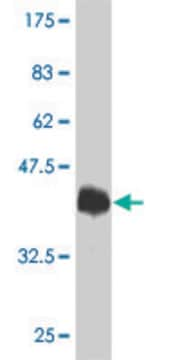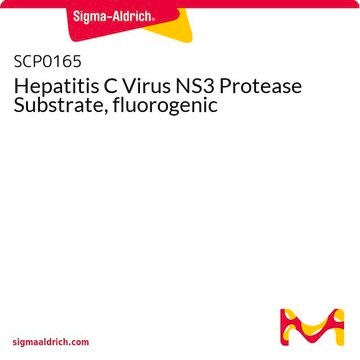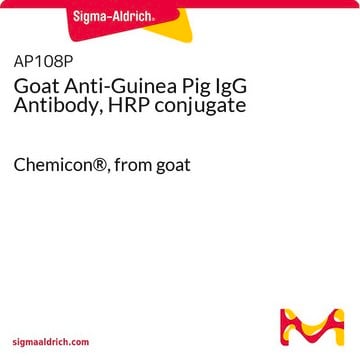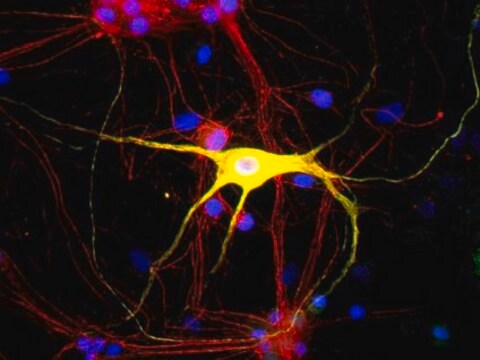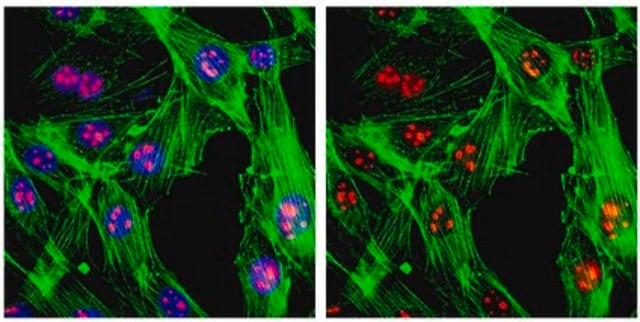03-110
RIPAb+ Ago2 - RIP Validated Antibody and Primer Set
ascites fluid, from mouse
Synonym(s):
Argonaute-2, Eukaryotic translation initiation factor 2C, Slicer protein, Piwi domain protein
Sign Into View Organizational & Contract Pricing
All Photos(3)
About This Item
UNSPSC Code:
12352203
eCl@ss:
32160702
NACRES:
NA.52
Recommended Products
biological source
mouse
Quality Level
antibody form
ascites fluid
clone
monoclonal
species reactivity
human
species reactivity (predicted by homology)
bovine
manufacturer/tradename
RIPAb+
Upstate®
technique(s)
RIP: suitable
immunoprecipitation (IP): suitable
western blot: suitable
isotype
IgG1κ
NCBI accession no.
UniProt accession no.
shipped in
dry ice
General description
Ago2 (argonaute-2), also known as eukaryotic translation initiation factor 2C (EIF2C2), is an essential component for siRNA-directed RNA interference (RNAi) response. Ago2 is an endonuclease required for the unwinding of siRNA duplex and assembly of siRNA into RNA-induced silencing complexes (RISC). Ago2 interacts with DICER1 through its Piwi domain. This Piwi domain is thought to provide RNA cleavage activity via a mechanism similar to RNase H. Ago2 activity is necessary for embryonic development as well as RNA-mediated gene silencing (RNAi).
Specificity
Recognizes Ago2.
Immunogen
KLH-conjugated, synthetic peptide containing the sequence YSGAGPALAPPAPPPPIQG.
Application
RNA Binding Protein Immunoprecipitation (microRNA):
RIP Lysate prepared from HeLa cells (2 X 107 cell equivalents per IP) were subjected to immunoprecipitation using 5 µL of either a normal mouse IgG or 5 µL of Anti-Ago2 antibody and the Magna RIP® RNA-Binding Protein Immunoprecipitation Kit (Cat. # 17-700).
Successful immunoprecipitation of Ago2-associated microRNA was verified by TaqMan microRNA assay, hsa-miR-23a. (Please see figures).
Please refer to the Magna RIP (Cat. # 17-700) or EZ-Magna RIP (Cat. # 17-701) protocol for experimental details.
Immunoprecipitation from RIP lysate:
Representative lot data.
RIP lysate from HeLa cells (2 X 106 cell equivalents per IP) was subjected to immunoprecipitation using 0.5 µL of either a normal mouse IgG or Anti-Ago2 antibody. Precipitated proteins (lane 1: mouse IgG, lane 2: anti-Ago2) and HeLa whole cell lysate (lane 3) were resolved by electrophoresis, transferred to nitrocellulose and probed with anti-Ago2 antibody (1:5,000 dilution).
Proteins were visualized using goat anti-mouse secondary antibody conjugated to HRP and chemiluminescence detection.
(Please see figures).
RIP Lysate prepared from HeLa cells (2 X 107 cell equivalents per IP) were subjected to immunoprecipitation using 5 µL of either a normal mouse IgG or 5 µL of Anti-Ago2 antibody and the Magna RIP® RNA-Binding Protein Immunoprecipitation Kit (Cat. # 17-700).
Successful immunoprecipitation of Ago2-associated microRNA was verified by TaqMan microRNA assay, hsa-miR-23a. (Please see figures).
Please refer to the Magna RIP (Cat. # 17-700) or EZ-Magna RIP (Cat. # 17-701) protocol for experimental details.
Immunoprecipitation from RIP lysate:
Representative lot data.
RIP lysate from HeLa cells (2 X 106 cell equivalents per IP) was subjected to immunoprecipitation using 0.5 µL of either a normal mouse IgG or Anti-Ago2 antibody. Precipitated proteins (lane 1: mouse IgG, lane 2: anti-Ago2) and HeLa whole cell lysate (lane 3) were resolved by electrophoresis, transferred to nitrocellulose and probed with anti-Ago2 antibody (1:5,000 dilution).
Proteins were visualized using goat anti-mouse secondary antibody conjugated to HRP and chemiluminescence detection.
(Please see figures).
Research Category
Epigenetics & Nuclear Function
Epigenetics & Nuclear Function
Research Sub Category
RNA Metabolism & Binding Proteins
RNA Binding Protein (RBP)
RNA Metabolism & Binding Proteins
RNA Binding Protein (RBP)
This RIPAb+ Ago2 -RIP Validated Antibody & Primer Set conveniently includes the antibody & the specific control PCR primers.
Packaging
10 assays per set. Recommended use: ~5 μL of antibody per RIP (dependent upon biological context).
Quality
RNA Binding Protein Immunoprecipitation:
RIP Lysate prepared from HeLa cells (2 X 107 cell equivalents per IP) were subjected to immunoprecipitation using 5 µL of either a normal mouse IgG or 5 µL of Anti-Ago2 antibody and the Magna RIP® RNA-Binding Protein Immunoprecipitation Kit (Cat. # 17-700).
Successful immunoprecipitation of Ago2-associated RNA was verified by qPCR using RIP Primers FOS (Please see figures).
Please refer to the Magna RIP (Cat. # 17-700) or EZ-Magna RIP (Cat. # 17-701) protocol for experimental details.
RIP Lysate prepared from HeLa cells (2 X 107 cell equivalents per IP) were subjected to immunoprecipitation using 5 µL of either a normal mouse IgG or 5 µL of Anti-Ago2 antibody and the Magna RIP® RNA-Binding Protein Immunoprecipitation Kit (Cat. # 17-700).
Successful immunoprecipitation of Ago2-associated RNA was verified by qPCR using RIP Primers FOS (Please see figures).
Please refer to the Magna RIP (Cat. # 17-700) or EZ-Magna RIP (Cat. # 17-701) protocol for experimental details.
Target description
100 kDa
Physical form
Anti-Ago2 (Mouse Monoclonal IgG1κ). One vial containing 50 µL of ascites with 0.05% sodium azide. Store at -20°C.
Normal Mouse IgG. One vial containing 125 μg of purified mouse IgG in 125 µL of stoage buffer containing 0.1% sodium azide. Store at -20°C.
RIP Primers, FOS. One vial containing 75 μL of 5 μM of each primer specific for human FOS gene. Store at -20°C.
FOR: GAG AGC TGG TAG TTA GTA GCA TGT TGA
REV: AAT TCC AAT AAT GAA CCC AAT AGA TTA GTT A
Normal Mouse IgG. One vial containing 125 μg of purified mouse IgG in 125 µL of stoage buffer containing 0.1% sodium azide. Store at -20°C.
RIP Primers, FOS. One vial containing 75 μL of 5 μM of each primer specific for human FOS gene. Store at -20°C.
FOR: GAG AGC TGG TAG TTA GTA GCA TGT TGA
REV: AAT TCC AAT AAT GAA CCC AAT AGA TTA GTT A
Storage and Stability
Stable for 1 year at -20°C from date of receipt.
Handling Recommendations: Upon receipt, and prior to removing the cap, centrifuge the vial and gently mix the solution. Aliquot into microcentrifuge tubes and store at -20°C. Avoid repeated freeze/thaw cycles, which may damage IgG and affect product performance
Handling Recommendations: Upon receipt, and prior to removing the cap, centrifuge the vial and gently mix the solution. Aliquot into microcentrifuge tubes and store at -20°C. Avoid repeated freeze/thaw cycles, which may damage IgG and affect product performance
Analysis Note
Control
Includes negative control mouse IgG antibody and control primers specific for human FOS.
Includes negative control mouse IgG antibody and control primers specific for human FOS.
Legal Information
MAGNA RIP is a registered trademark of Merck KGaA, Darmstadt, Germany
UPSTATE is a registered trademark of Merck KGaA, Darmstadt, Germany
Disclaimer
Unless otherwise stated in our catalog or other company documentation accompanying the product(s), our products are intended for research use only and are not to be used for any other purpose, which includes but is not limited to, unauthorized commercial uses, in vitro diagnostic uses, ex vivo or in vivo therapeutic uses or any type of consumption or application to humans or animals.
Storage Class Code
10 - Combustible liquids
Certificates of Analysis (COA)
Search for Certificates of Analysis (COA) by entering the products Lot/Batch Number. Lot and Batch Numbers can be found on a product’s label following the words ‘Lot’ or ‘Batch’.
Already Own This Product?
Find documentation for the products that you have recently purchased in the Document Library.
Xia Zheng et al.
Cellular physiology and biochemistry : international journal of experimental cellular physiology, biochemistry, and pharmacology, 51(3), 1340-1353 (2018-11-28)
The Warburg effect is one of the main metabolic features for cancers, with long non-coding RNA (lncRNA) being involved as a class of crucial regulators. Our previous studies have shown that ginsenoside 20(S)-Rg3, an active saponin monomer extracted from red
Guoli Shao et al.
International journal of oncology, 54(5), 1665-1675 (2019-03-01)
Accumulating evidence has demonstrated that long non‑coding RNAs (lncRNAs) play important roles in the pathogenesis and development of diverse types of human disorders. Cancer susceptibility candidate 9 (CASC9), a gene encoding a lncRNA, has frequently been reported to be dysregulated and
Mickie Takagi et al.
Applied biochemistry and biotechnology, 110(2), 91-100 (2003-09-30)
Haemophilus influenzae type b (Hib) causes invasive infections in infants and young children. Vaccines consisting of Hib capsular polysaccharide (polymer of ribosylribitol phosphate [PRP]) conjugated to a protein are effective in the prevention of such infections. The production of capsular
Manman Li et al.
American journal of cancer research, 10(1), 38-59 (2020-02-18)
MicroRNAs (miRNAs) are short and non-coding RNAs binding to 3'UTR of target mRNAs to downregulate their expression. Recent studies have shown that miRNAs indirectly regulated alternative splicing (AS) by targeting splicing factors and caused shifts in splicing patterns of target
Xinmei Liu et al.
Oncology reports, 44(2), 599-610 (2020-07-07)
OSER1 antisense RNA 1 (OSER1‑AS1), a long noncoding RNA, has been well studied in the context of hepatocellular carcinoma. However, its expression status, specific functions, and tumorigenic mechanism in non‑small cell lung cancer (NSCLC) remain uninvestigated. Hence, this study aimed
Our team of scientists has experience in all areas of research including Life Science, Material Science, Chemical Synthesis, Chromatography, Analytical and many others.
Contact Technical Service
